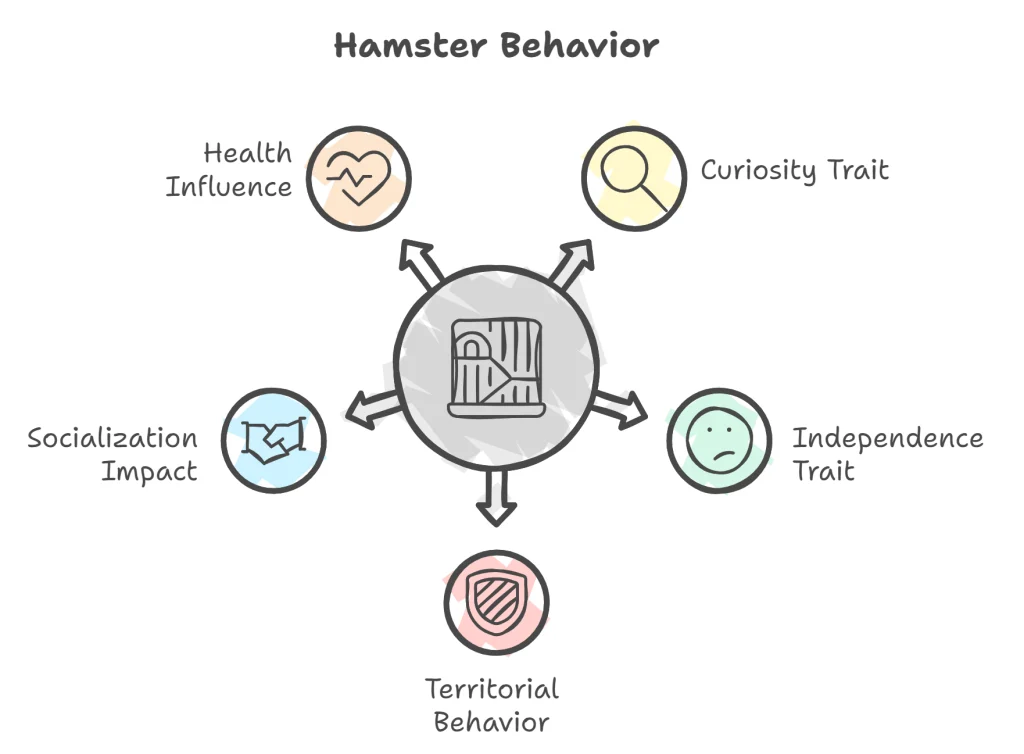Pet lovers have long loved hamsters for their cute, furry faces and antics. But, for those considering a hamster, a key question often arises: are hamsters friendly? This guide will explore hamster friendliness. It will cover their behavior, personality, and how to build a bond with these tiny pets.
Understanding Hamster Behavior and Personality Traits

To truly appreciate hamster friendliness, it’s essential to understand their natural instincts and behaviors. Hamsters are nocturnal creatures, meaning they’re most active during the night. This can sometimes lead to misconceptions about their sociability, as they may seem less interactive during daylight hours when humans are typically awake.
Hamsters possess a range of personality traits that can influence their friendliness:
- Curiosity: Many hamsters are naturally inquisitive, which can make them appear friendly as they explore their surroundings and interact with their owners.
- Independence: Hamsters are generally solitary animals, which means they don’t rely on social interaction as much as some other pets might.
- Territorial behavior: In the wild, hamsters are protective of their living spaces, which can sometimes translate to defensive behavior in captivity.
Several factors can influence a hamster’s temperament:
- Early socialization
- Handling frequency and quality
- Environmental stress
- Individual personality differences
- Health and well-being
Are Hamsters Friendly Pets? Exploring Their Social Nature
When it comes to hamster friendliness, it’s important to separate myths from reality. While hamsters may not be as overtly affectionate as dogs or cats, they can certainly form bonds with their owners and display friendly behaviors.
Comparing Different Hamster Breeds’ Friendliness

Not all hamsters are created equal when it comes to friendliness. Let’s explore the temperaments of two popular hamster breeds:
Syrian Hamster Personality
Syrian hamsters, also known as Golden hamsters, are often considered one of the friendlier hamster species. They tend to be:
- More tolerant of handling
- Generally calmer in temperament
- Easier to tame and socialize
Dwarf Hamster Temperament
Dwarf hamsters, including Roborovski, Campbell’s, and Winter White varieties, can also make friendly pets, but they have some distinct characteristics:
- More energetic and faster-moving
- May require more patience to tame
- Can be more nippy if not properly socialized
Hamster Interaction with Humans and Other Pets
Hamsters can learn to enjoy human interaction, but it’s crucial to remember that they’re not naturally social animals like some other pets. With patience and consistent positive experiences, most hamsters can become comfortable with gentle handling and even seek out interaction with their owners.
As for other pets, it’s generally recommended to keep hamsters separate from larger animals like cats and dogs, as well as other small pets. Hamsters are solitary by nature and typically do best when housed alone.
Fostering a Friendly Relationship with Your Hamster
Building a friendly relationship with your hamster takes time, patience, and understanding. Here are some tips to help you tame your furry friend:
- Start slow: Allow your hamster to adjust to its new environment before attempting to handle it.
- Use food as a motivator: Offer treats from your hand to create positive associations.
- Speak softly: Use a gentle voice to help your hamster become familiar with your presence.
- Respect boundaries: Pay attention to your hamster’s body language and never force interaction.
Handling Hamsters Safely: Best Practices
Proper handling is crucial for maintaining a friendly relationship with your hamster:
- Always wash your hands before and after handling.
- Support your hamster’s entire body when picking it up.
- Avoid sudden movements or loud noises that might startle your pet.
- Never grab a hamster from above, as this mimics predator behavior.
Bonding with Your Hamster: Activities and Techniques
Strengthen your bond with your hamster through these activities:
- Offer supervised playtime outside the cage
- Create obstacle courses or mazes for mental stimulation
- Teach simple tricks using positive reinforcement
- Provide a variety of toys and chews to keep your hamster engaged
Addressing Common Concerns: Hamster Biting and Aggression
While hamsters can be friendly, it’s not uncommon for owners to experience occasional nipping or signs of aggression. Understanding why this happens can help prevent and manage such behaviors.
Understanding Why Hamsters May Bite
Hamsters may bite for various reasons:
- Fear or feeling threatened
- Unfamiliarity with handling
- Mistaking fingers for food
- Pain or discomfort
Preventing and Managing Aggressive Behavior
To minimize aggressive behavior:
- Provide a stress-free environment
- Handle your hamster regularly and gently
- Avoid waking your hamster suddenly
- Ensure your hamster has plenty of enrichment activities
When to Seek Professional Help
If aggressive behavior persists despite your best efforts, it may be time to consult a veterinarian who specializes in exotic pets. They can rule out any underlying health issues and provide additional guidance on behavior modification.
Conclusion
So, are hamsters friendly? The answer is a resounding yes – with the right care, patience, and understanding. While they may not be as overtly affectionate as some other pets, hamsters can develop strong bonds with their owners and display friendly behaviors. Remember that each hamster is an individual with its own unique personality. By providing a loving home, gentle handling, and plenty of opportunities for positive interaction, you can foster a friendly and rewarding relationship with your furry companion.
FAQs
- How long does it take to tame a hamster? Taming a hamster can take anywhere from a few days to several weeks, depending on the individual animal and the consistency of your efforts.
- Can hamsters recognize their owners? Yes, hamsters can learn to recognize their owners through scent and repeated positive interactions.
- Are some hamster breeds friendlier than others? While individual personalities vary, Syrian hamsters are often considered to be among the friendlier breeds.
- How often should I handle my hamster to maintain friendliness? Aim for short, daily handling sessions of about 10-15 minutes to help maintain a friendly relationship with your hamster.
- Can hamsters be kept in pairs or groups? Most hamster species are solitary and should be housed individually to prevent fighting and stress. The exception is sometimes dwarf hamsters, but even they often do best alone.

